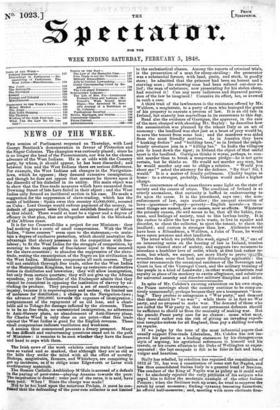The Irish news of the week exhibits certain traits of
lawless- ness so varied and so marked, that although they are as old as the hills they strike the mind with all the effect of novelty. Bishops, magistrates, farmers, and Whiteboys, are conspiring to get up incidents, as if to oblige some Edgeworth or Lever with confirmatory materials.
The Roman Catholic Archbishop M'Hale is accused of a default in the paying of poor-rates—playing Ananias towards the poor. The imputation-is denied : some part of the rates, it is said, have been paid. When ? Since the charge was made? Not to be too hard upon the notorious Prelate, it must be con- fessed that the defrauding of the poor-rate collector is not limited
to the ecclesiastical classes. Among the reports of criminal trials, is the prosecution of a man for sheep-stealing : the prosecutor was a substantial farmer, with land, grain, and stock, in goodly store ; he admitted that the prisoner had been an honest and a starving man ; the starving man had been refused out-door re- lief ; the man of substance, now prosecuting for his stolen sheep, had received it ! Can any more ludicrous and depraved perver- sion of the law be imagined ? Conceive its effect, too, as avowed in such a case.
A third trait of the lawlessness is the resistance offered by Mr. Waldron, a magistrate, to a party of men who besieged the gates of his property to execute a process of law. It is an old tale in Ireland, but scarcely less marvellous in its recurrence to this day.
Read also the evidence of Garrigan, the approver, in the case of the men charged with shooting Mr. Bayley : he describes how the assassination was planned by the tenant Daly as an act of economy : the landlord was shot just as a beast of prey would be, to save the tenant from some loss ; and the murderer was aided from the most friendly motives. As in America they have " husking frolics " and abuilding bees," so in Ireland the neigh- bourly creatures join in a " killing bee." In India the villagers join to hunt down the tiger; in Ireland the object of that useful sport is the landlord. Garrigan thinks it worse, perhaps, to com- mit murder than to break a temperance pledge—he is not quite certain, but he thinks so. He would not murder any man, but he would murder any one to oblige a relative. " Would you shoot me?" asked the attorney for the defence. "By Gor I Sir, I would." It is a matter of family politeness. Charity begins at home : to a stranger, probably, Garrigan would make a higher charge.
The concurrence of such cases throws some light on the state of society and the causes of crime. The condition of Ireland is so utterly anomalous, that curiosity is baffled in endeavouring to fix upon the cause. It is the priesthood, says one ; the non- enforcement of law, says another ; the unequal execution of laws—ignorance—Popery—poverty—English misrule—a thou- sand things are named, now as causes, now as effects. Whatever the primary causes, the evil seems to be, that all the habits, cus- toms, and feelings of society, tend to this lawless laxity. It is the custom to allow the law to go to waste, to live in squalor and disorder to cheat the collector, to eject the tenant, to shoot the landlord; and custom is stronger than law. Alcibiades would have been a Ribaudman, a Waldron, a John of Tuain, he would have eaten potatoes and shot landlords. The letter which we publish this week, signed " II. M.," one of an interesting series on the bearing of law in Ireland, touches upon the vitiated state of society, and suggests two measures to introduce a healthier love of order, which at first look rather re- mote, but which, we suspect, are more likely to prove sp:cific remedies than some that look more didactically applicable : the writer recommends the occasional residence of the Sovereign and Court in lieu of the Viceregal Court, and the military training of the people in a kind of Landwehr ; in other words, substitute real royalty in place of its mockery to excite allegiance, and substitute for universal anarchy and disorder military discipline and order.


























